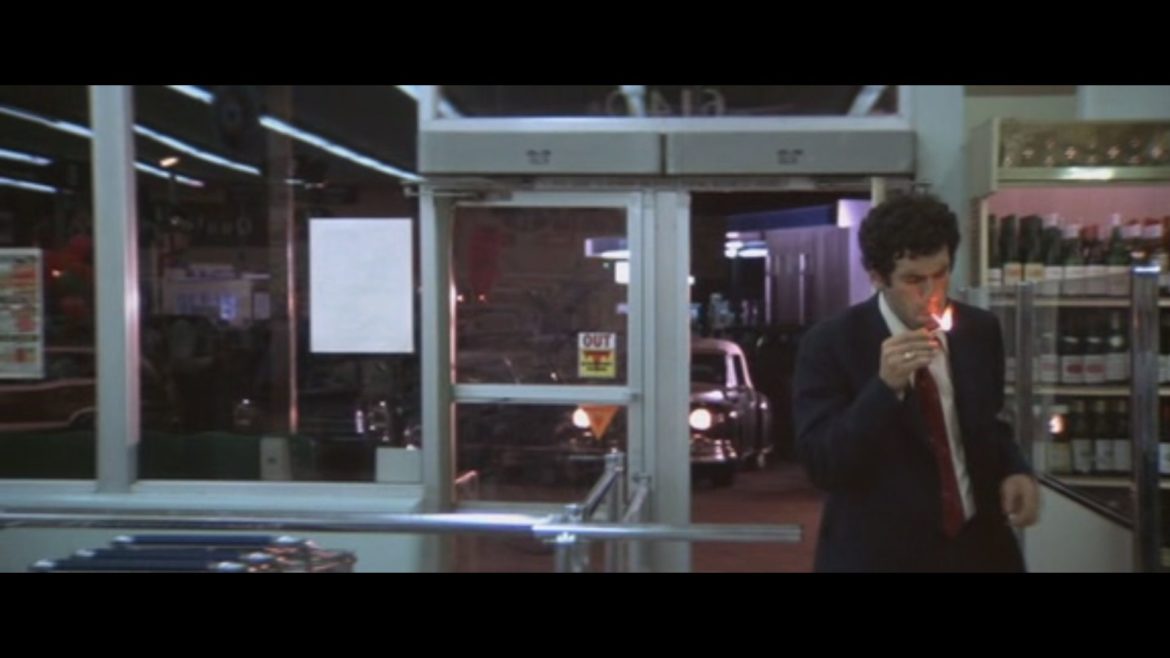Robert Altman strikes again. This will be the last one for a while, I promise.
As in his previous Song for a Sunday entries McCabe and Mrs. Miller and Popeye, Altman’s neo-noir The Long Goodbye leans so heavily on its idiosyncratic score for mood and meaning(s) that it’s hard to imagine the film without it. It might be even more true in this case, since the film shares its title with both the Raymond Chandler novel on which it’s based (give or take) and the song that (almost) constitutes its entire soundtrack.
As in McCabe, where three haunting Leonard Cohen songs weave in and out at key moments (setting the stage, commenting on aspects the script omits, and providing an aural epilogue of sorts), The Long Goodbye deploys its title song over and over in different variations, both diegetic and non. It’s playing constantly – to name a few instances, Elliot Gould’s Marlowe humorously hums it to himself right after its introduction as the theme, it’s on the car radio, a Muzak version plays in the grocery store, and it even shows up as a doorbell chime.
Altman says he inserted the motif because it amused him, which, while no doubt true, also sounds like typical Altman puckishness and genial mindfuckery. With all due respect to the auteur, I think we can safely assume that an aesthetic choice like using variations on a single song to constitute the near entirety of the score was made with a bit more consideration than “It’d be funny.” And even if not, the result allows for a closer reading than that anyway.
I was hesitant to start writing this, even though it’s a fantastic song and movie, for two reasons: 1) I’ve now included three Altman films, and I’m aware there are other films in the world, and 2) Adam Scovell of Celluloid Wicker Man, an excellent site I discovered while looking up details on the film, has written up a formidable and persuasive analysis already. Seriously, go read it. It’s great.
There are a couple things left to say about the song’s use(s) here, though. The film, a revisionist 70s noir in much the same way McCabe was a revisionist 70s Western, has been slammed as pastiche, especially upon its release. Critics savaged it – as Pauline Kael noted, a lot of people, especially cinephiles, didn’t appreciate their iconic Marlowe being toyed with. Instead of Dick Powell or (especially) Bogart, we get stumbling, mumbling Elliot Gould, a man out of time, wearing suits and chain-smoking while his hippie neighbors lounge around in the nude or do yoga, and seemingly out of his depth and not really seeing the whole picture, casually responding to everything with “It’s alright with me,” abiding like some proto-Dude. Altman and Gould privately called this character “Rip Van Marlowe,” implying he fell asleep in the 50s and woke up 20 years later, adhering to a code that no longer quite fit.
This is one function of the song(s) – they too seem to be sometimes from another era, sometimes from this one, wedded to commercial uses like grocery store Muzak and kitsch technologies like novelty doorbells, played on sitar to signal the hippie collective, emanating from the car radio as a torch song hearkening back to a bygone era. It’s a song going through some sort of identity crisis, as it shifts and is reformulated to suit individual scenes, reworked in miniature like Altman is doing with the mythic Marlowe in general.
It also gives the sense of some grand, mysterious interconnectedness, some underlying grammar linking scenes, calling back to others, giving glimpses of hidden threads. Which, after all, are what both detectives, even goofballs like Gould’s Marlowe, are after, just as we are as viewers, readers, audiences.
And anyway, if the film is simply pastiche as its earlier critics alleged, what better joke than to constantly rework its score in endless variations? Maybe Altman was right – that would be pretty funny.
The scene in which Marlow tries to trick his cat into eating off-brand catfood showcases much of this, with the song weaving in and and morphing in the background:

